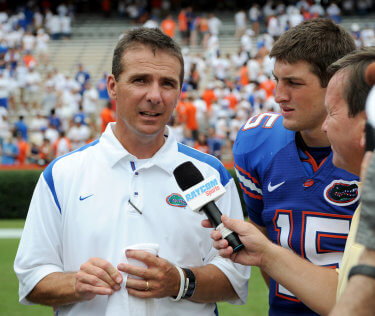After finding success in terms of wins and losses, including two national championships, as the head football coach at Bowling Green State University, the University of Utah, and the University of Florida, Urban Meyer found himself having to step away from coaching for a full year due to serious health complications caused by the stress of coaching. In fact, when referring to a chest pain incident in which he had to be rushed to the ER, he stated, “I was scared for my health…I was scared for my family” (Sneed, 2016, par. 90).

In his time off from coaching, Meyer focused on improving his health and his relationships with his family. Then the opportunity came to become the head football coach for The Ohio State University – a life-long dream for the Ohio native. At his daughter’s insistence however, Meyer was required to sign a contract his family had put together and follow its conditions before being able to accept the position. It read:
My family will always come first. I will take care of my family and maintain good health. I will not go more than nine hours a day at the office. I will trust God’s plan and not be overanxious. I will eat three meals a day (Sneed, 2016, par. 30).
What has the result been so far? His emphasis of finding that work-life balance appears to be working not only on-the-field (a 73-8 win-loss record in six years including a 2014 national championship), but most importantly off it. According Meyer, he has found better balance and has been able to separate his professional and home life: “It’s always about our children, and really, more about our lives away from football. And I like that much better” (Sneed, 2016, par. 118).
DIII Coaches’ Perspectives
Meyer’s experience of finding the right balance for him has been publicized due to his position as a head coach for a high profile National Collegiate Athletic Association (NCAA) Division I football program. But regardless of the level a coach is, it can be difficult to figure out a healthy balance between one’s personal and professional life (Dabbs, Graham, & Dixon, 2016).
This article shares advice from several NCAA Division III (DIII) head coaches about how to attain a work-life balance. The information is from a larger study on the development of effective coaches at the DIII level (see criteria for the selection ofeffective coaches in my previouspost/article). I’ve identified the coaches named in this article by pseudonyms.
Release
Coach Lee, with 15-plus years as a head baseball coach, spoke of needing a release from coaching in order to not burn out. He has found this by maintaining his friendships:
So, that’s my release when you talk about work-life balance that I think I’m a relationship person, so I do like, you know friendships and stuff…and I think that’s what I’m starting to value more is my friendships…I think I got it to a point sometimes where I need to maybe reel it in sometimes the older I get (laughing).

Family
As was the case with Coach Dryden, who is still finding the balance between coaching softball and being a spouse and parent, the search for success in both areas is ongoing:
I don’t necessarily know if it really matters female or male, but I don’t know how you properly accomplish a balance when you have a family in this profession, how one doesn’t become affected and that is what I’m working on.
Similarly, Coach Peterson (a head baseball coach) shared that it takes time to adapt to being married and a parent after being a single coach so many years before:
Not that coaches can’t have families and be married and be very successful, but it’s difficult. You know, it’s certainly difficult and it has been very difficult for me these last five years figuring out after having done it for so long a different way. But, you know, it’s working and you know it’s a learning experience for me each day and we’re figuring it out.
For Coach Clark, who has 35-plus years of experience as a head women’s basketball coach, her thoughts were more on not being able to find a balance, but having the support of her significant other:
You don’t ever find it. You’ve got to get lucky and you’ve got to have a partner that incredibly loves you, that understands your passion and is willing to be second or third on the list while you’re in season for four months. It really comes down to that.
In the case of Coach Jensen (a head men’s basketball coach for 20-plus years), he has found that coaching at the NCAA Division III (DIII) level has allowed him to find more balance between coaching and spending time with his family:
You know, I think any coach, certainly in college, cheats his family. I think that’s just a job reality. And it’s just the way it is. I see my players much more than I see my son right now…So, I think that’s part of being a coach. You know, I think that’s a tough, tough thing and I think that gets harder the higher you go as far as Division I, II. That’s why I’ve remained for the most part a Division III coach, because I think I can handle that work-life balance better being a head coach at Division III in determining my own schedule rather than being an assistant someplace. And, like my mentor, he has had to move all over the place and I know he struggles…

Solutions
What solutions are there for finding a true work-life balance? Coach Nelson described that throughout the years she has tried to do better at balancing both her family and coaching. This meant she had to let go of a few things and remember the true reason she coaches:
I think that the hardest thing for me was being able to separate the two…I don’t want to say that we’ve never figured out the balance piece of it, because I think I’ve made decisions in particular in the recruiting piece of it and my summer piece of it, that I haven’t spent my entire summer at the basketball gym or shootout. I pick what I need to do, but to me that off-season was always about my kids and my family. That was my mentality. Not everybody has that mentality and I think early on you have to decide what is this about? Do you want to be known by how many wins when you die or who the person you were? And, sometimes I think we get caught up in the winning and losing vs. really what’s it about, and at the end of the day, it’s about the kids, not just my own children, but these kids and their experience.
On a similar note, Coach Webber (a head women’s lacrosse coach of 15-plus years) emphasized how she has focused on being efficient with her time and has committed herself to the time she does have, whether coaching or being with her family:
There’s also the time aspect that goes into it. I mean, I devote a lot of time to it, but now that I have a daughter and family, that’s not what I devote all my time to. I want at least a little bit to be able to give it to them. That’s pretty important to me…I’m making sure I’m making the most of my time when I’m here and doing things efficiently and then finding the little pockets of time that don’t interrupt with the child and the family time to be able to do stuff or you bring them along.
Conclusion
Urban Meyer found that signing a contract with standards to follow helped him to find work-life balance. However, given the diverse backgrounds of all coaches, whether young or old, single or married, to avoid burnout what’s important is to find some type of “release” away from coaching their sport.
Coach Webber’s quote on how she manages and controls her time is good advice for any coach to help stay on-task when attempting to juggle the different responsibilities and still make time for oneself (Dabbs et al., 2016). Coaches ask it of their athletes, they should also require it of themselves.
Finally, coaches must remember why they are putting in all this time. As Coach Nelson stated, it should be focused on developing athletes into not only being better teams and athletes, but also into being better human beings (Collins, Gould, Lauer, & Chung, 2009). If coaches can be true to themselves and be self-aware of how they can find a work-life balance between coaching and their personal lives, they will be more attentive to their athletes’ needs when the time comes.
References
Collins, K., Gould, D., Lauer, L., & Chung, Y. (2009). Coaching life skills through football: Philosophical beliefs of outstanding high school football coaches. International Journal of Coaching Science, 3(1), 29-54.
Dabbs, S. M., Graham, J. A., Dixon, M. A. (2016). A socio-cultural perspective of the work-life interface of college coaches: A cohort analysis. Journal of Issues in Intercollegiate Athletics, 9, 262-282.
Sneed, B. (2016, September 13). ‘I’m not the lone wolf.’ Bleacher Report. Retrieved from http://thelab.bleacherreport.com/i-m-not-the-lone-wolf/
